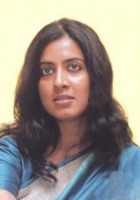Arundhathi Subramaniam
Arundhathi Subramaniam Poems
You believe you know me,
wide-eyed Eng Lit type
from a sun-scalded colony,
reading my Keats – or is it yours –
...
In the women's compartment
of a Bombay local
we seek
no personal epiphanies.
...
Give me a home
that isn't mine,
where I can slip in and out of rooms
without a trace,
...
To swing yourself
from moment to moment,
to weave a clause
that leaves room
...
My grandmother,
wise even at eight,
hid under her bed
when her first suitor came home.
...
Driving through the Trossachs I see
the picture I drew as a five-year-old
in Bombay – a rectangle
with two square windows,
...
This shoebox started out
a stiff-upper-lipped quadrilateral,
Upholder of Symmetry, Proportion, Principle,
sanctuary to an upright couple
...
This time we didn't circle each other
hackles raised,
fur bristling.
...
My grandparents in January
on a garden swing
discuss old friends from Rangoon,
the parliamentary session, chrysanthemums,
...
It takes a certain cussedness
to be a tree in this city,
a certain inflexible woodenness
...
And on days like this
nothing else will do.
Nothing but that whisper
of breath against the ear.
...
There was nothing simple about it
even then -
an eleven-year-old's hunger
for the wet perfection
...
Supple as wisteria
her plait of hair across our beds -
my talisman at the age of five
against torch-eyed gods and ancestors
...
Again and again the same questions, my love,
those that confront us
and vex nations,
or so they claim -
...
(returning to Bombay after November 26, 2008)
This time we didn't circle each other
hackles raised,
fur bristling.
This time there was space
between us -
and we weren't competing.
Space enough and more
for the nose-digging librarian
and her stainless steel tiffin box,
for the Little Theatre peon to read me
his Marathi poems
on rainy afternoons
for the woman on the 7.10 Bhayandar slow
with green combs in her hair
to say
and say again,
He's coming to get me.
He's coming
This time
the city surged
towards me
mangy
bruised-eyed
non-vaccinated
suddenly
mine.
...
Arundhathi Subramaniam Biography
Arundhathi Subramaniam is a poet and writer and on spirituality and culture. She has worked over the years as poetry editor, curator, and journalist on literature, classical dance and theatre. She divides her time between Bombay and a yoga centre in Coimbatore. Arundhathi Subramaniam is the author of three books of poems: most recently Where I Live: New & Selected Poems Bloodaxe Books, UK. Her prose works include the bestselling biography of a contemporary mystic Sadhguru: More Than a Life, Penguin and a book on the Buddha (Book of Buddha), Penguin Books (reprinted several times). As editor, she has worked on a Penguin anthology of essays on sacred journeys in the country (Pilgrim’s India), and co-edited a Penguin anthology of contemporary Indian love poems in English (Confronting Love). As a poet, she has been invited to literary conferences and festivals in various parts of India, as well as in the UK, Italy, Spain, Holland, Turkey, China, West Africa and Israel, and her work has been translated into several languages, including Hindi, Tamil, Italian and Spanish. She has received the Raza Award for Poetry (2009), as well as the Charles Wallace Fellowship (for a 3-month writing residency at the University of Stirling) in 2003; the Visiting Arts Fellowship for a poetry tour of the UK (organized by the Poetry Society) in 2006; and the Homi Bhabha Fellowship in 2012. In 2004, she was invited to edit the India domain of the Poetry International Web, which grew into a significant web journal of contemporary Indian poetry. Her poetry has been published in various international journals and anthologies, including Reasons for Belonging: Fourteen Contemporary Poets (Penguin India); Sixty Indian Poets (Penguin India), Both Sides of the Sky (National Book Trust, India), We Speak in Changing Languages (Sahitya Akademi), Fulcrum No 4: An Annual of Poetry and Aesthetics (Fulcrum Poetry Press, US), The Bloodaxe Book of Contemporary Indian Poets (Bloodaxe, UK) and Atlas: New Writing (Crossword/ Aark Arts). Arundhathi has worked at the National Centre for the Performing Arts, Mumbai, for several years, leading a discussion-based inter-arts forum named Chauraha. She has also been Head of Indian Classical Dance at the NCPA. She has written on literature, classical dance, theatre and culture for various newspapers (including The Times of India, The Hindu, The Indian Express, among others) since 1989. She has also been columnist on culture and literature for Time Out, Mumbai, The Indian Express and New Woman.)
The Best Poem Of Arundhathi Subramaniam
Prayer
May things stay the way they are
in the simplest place you know.
May the shuttered windows
keep the air as cool as bottled jasmine.
May you never forget to listen
to the crumpled whisper of sheets
that mould themselves to your sleeping form.
May the pillows always be silvered
with cat-down and the muted percussion
of a lover’s breath.
May the murmur of the wall clock
continue to decree that your providence
run ten minutes slow.
May nothing be disturbed
in the simplest place you know
for it is here in the foetal hush
that blueprints dissolve
and poems begin,
and faith spreads like the hum of crickets,
faith in a time
when maps shall fade,
nostalgia cease
and the vigil end.
